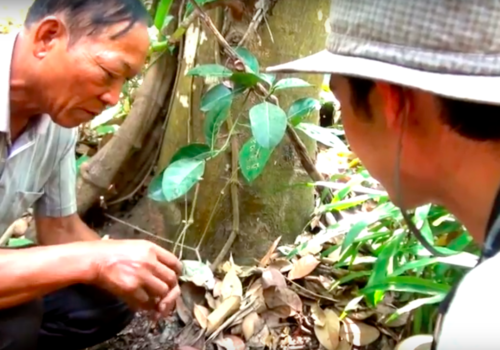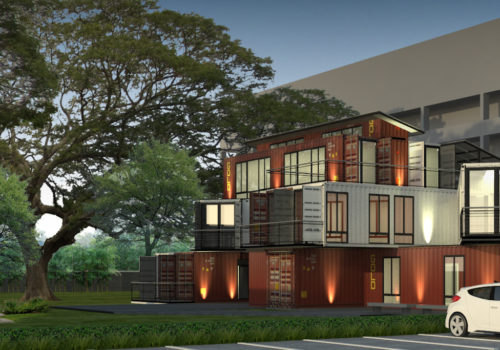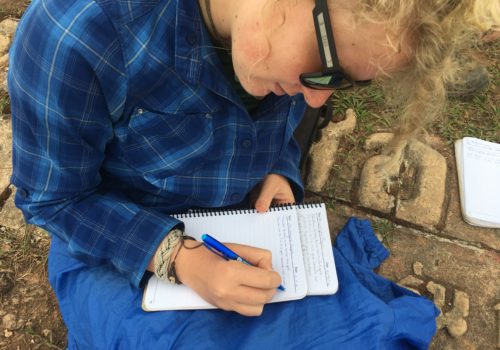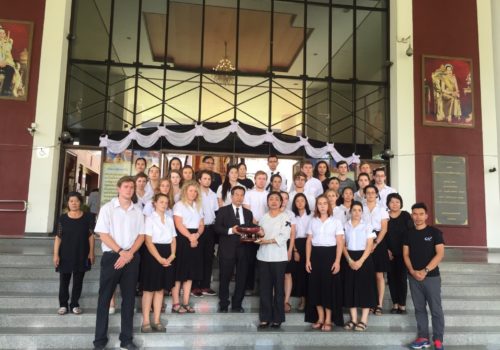As I write this Monday night (Thailand time), the government is working to clear the streets, the opposition “red shirts” have issued a call to fall back to the main protest site around government house, and there are sporadic protests in the provinces. No one really knows what is going to happen next.
It can be difficult at times like these to know what is going on, since there are so many rumors, mis-reported new stories, and unconfirmed reports. Through it all, however, day-to-day life goes on. Today is part of the Thai New Year celebration of songkran, a water festival, and throughout most of the country people are having fun, throwing water on each other, going to local fairs, and enjoying time off from work and a relief from the heat of April.
Two excellent articles out today, not on the details of the crisis so much as the issues surrounding them. Both are well worth a read, and give a lot of good background on what is happening and why.
Philip Bowring writing an op-ed in The New York Times (What Shirt for Thailand?):
The situation is not beyond retrieval. Thailand has always flourished on pragmatic compromises, domestic and international. Ethnic homogeneity and the economic interests of a society with few big corporations but many small businessmen and independent farmers all make it unlikely that there will be widespread bloodshed.
But there remains a fundamental divide over the rules of the political game. Social divisions must be bridged if Thailand is to return to the promise of 1997, when elections and a new constitution seemed to put the nation on a path of liberal democracy.
Another good article from The Economist, “Thailand’s ugly crisis“:
Many Thais are heartily sick of the crisis and its enormous damage to the economy in terms of lost investment and tourists. Another military coup is rumoured, although it is unclear where the army’s political inclinations lie. Presumably Mr Abhisit’s days are numbered as prime minister, though who might succeed him is anyone’s guess. Mr Thaksin hopes to ride the protests and return to power. Yet with plenty of scores to settle, his would presumably be a brittle and autocratic rule at a time when reconciliation is badly needed. Fresh elections are probably the best bet, with the promise of a search for a broad political consensus for constitutional change to allow a more representative politics. For now, with violence in the streets again, Thailand teeters on the brink.
As someone who has lived in Thailand most of the last 20 years, and who has been through more than one coup d’état, it is still difficult to know what is going to happen, and how it will impact the country as a whole (the big picture) and our specific program and students (the details).
How do we figure out what is going on, and how best to respond?
There are a number of things we do in this sort of situation, and it may be helpful to share some of it, both for students, parents, partner schools, and for other faculty and/or programs who might face a similar situation.
We of course have an emergency response plan, a team of well-trained staff, and have worked out in advance what to do in a variety of scenarios. I (Mark) am a warden with the US Consulate in Chiang Mai, so get updates directly from the Consulate when they are issued, and also know many of the consular folks as personal friends. All of our staff carry cell-phones, and when students are in-country, the phone are on 24/7 in case of an emergency. We have a list of student cell phones, parental and school emergency contacts, etc. News feeds (online and off) are monitored daily for important information, especially as concerns security and threats. All of that is (or at least should be) routine for any study-abroad program. (You can read more about our approach to risk management at “The Objective Hazards of Culture: Risk Management in an International Setting” here as a PDF.)
The key is knowing the place with the sort of “deep knowing” David Orr talks about when referring the ecological education and knowing a river or mountain.
“…[A] course on a nearby river might require students to live on the river for a time, swim in it, canoe it, watch it in its various seasons, study its wildlife and aquatic animals, listen to it, and talk to people who live along it. A river become…”a microcosm of the world” and a doorway to wider knowledge…there are some things that cannot be known or said about a mountain, or a forest, or a river—things too subtle or too powerful to be caught in the net of science, language, and intellect.” (p. 96, Earth In Mind: On Education, Environment And The Human Prospect, 1994)
You have to “swim” in a culture to know it deeply.
For a culture and a country, knowing the community, the normal rhythms of day-to-day life, being comfortable speaking Thai everyday with friends and acquaintances (getting inside the skin of the culture), spending a lot of time reading and talking about politics with Thai and ex-pat experts. It is in part having a network of trusted friends, both Thai and ex-pat residents (foreigners) who are themselves well connected. People you can trust, who have good judgement, and who you can ask for help, advice and trusted opinion. Moving between the academic world of the urban elite to the world of marginalized villagers (in the North, Northeast and South especially) means that we have friends who are poor farmers, fishermen and tribal people–all of whom have a different view on what is happening, and how it fits into the bigger picture. It isn’t just the opinions of a Thai political scientist that matter, but also our uncles, aunts, older brothers and sisters out in the villages who matter.
Deep knowing doesn’t tell you what is going to happen, but helps you know what to do when something does happen.
So while there is not a simple formula to calculate what is going to happen and what we should do about it, deep knowing, a cautious awareness and multiple sources of information go a long way towards helping us know what to do and what is happening. We are fortunate to have excellent students who love Thai culture and dive into the language and home-stays with gusto (even when it is hard). As they develop cultural sensitivity and awareness, strong relationships with host families, and a good understanding of how to live in Thailand, it makes our job not just much easier, but deepens our own understanding of this place as we see them struggle to create a new home.
As the articles above point out, there are some significant changes happening in Thailand, and the rural-urban gap needs to be bridged. Having close friends among the urban elite as well as the marginalized rural folk leads me to be cautiously optimistic about the eventual outcome, but concerned as well for a country and a people that we love as the problems get sorted out.



